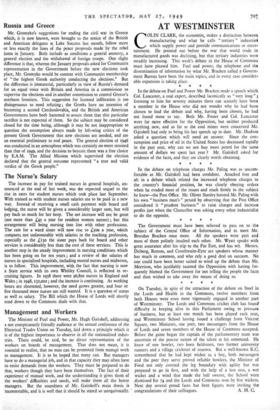The Nurse's Salary
The increase in pay for trained nurses in general hospitals, an- nounced at the end of last week, was the expected sequel to the rise in rates for student nurses which took place last September. With trained as with student nurses salaries are to be paid in a new way. Instead of receiving a small cash payment with board and lodging, the nurse will be given a considerably larger sum, but will pay back so much for her keep. The net increase will not be great (not more than £45 a year for resident women nurses) ; but this arrangement will bring nursing into line with other professions. The rate for a ward sister will now rise to £5oo a year, which compares not unfavourably with salaries in the teaching profession, especially as the £130 the sister pays back for board and other services is considerably less than the cost of these services. This is another step in the steady improvement in nursing conditions which has been going on for ten years ; and a review of the salaries of nurses in specialised hospitals, including mental nurses and midwives, is to follow. This improvement, with the fact that nursing is now a State service with its own Whitley Council, is reflected in re- cruiting figures. In 1938 there were 96,80o nurses in England and Wales ; in 1948, 132,000 ; and the increase is continuing. As working hours are shortened, however, the need grows greater, and four or five thousand more nurses are still wanted. It is a question of status as well as salary. The Bill which the House of Lords will shortly send down to the Commons deals with that.






































 Previous page
Previous page